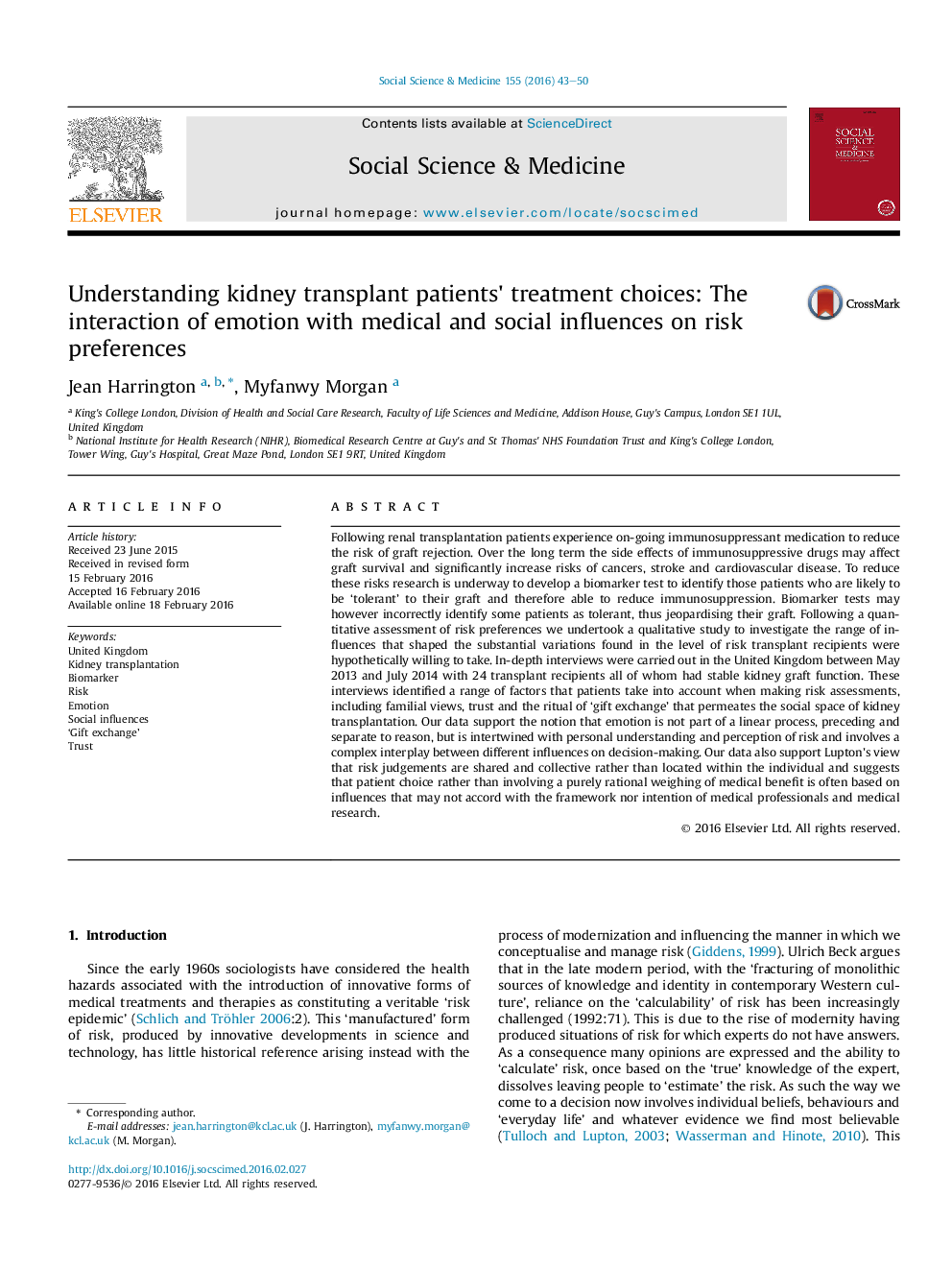| کد مقاله | کد نشریه | سال انتشار | مقاله انگلیسی | نسخه تمام متن |
|---|---|---|---|---|
| 7330333 | 1476014 | 2016 | 8 صفحه PDF | دانلود رایگان |
عنوان انگلیسی مقاله ISI
Understanding kidney transplant patients' treatment choices: The interaction of emotion with medical and social influences on risk preferences
ترجمه فارسی عنوان
درک گزینه های درمان بیماران پیوند کلیه: تعامل احساسات با تأثیرات پزشکی و اجتماعی بر ترجیحات ریسک
دانلود مقاله + سفارش ترجمه
دانلود مقاله ISI انگلیسی
رایگان برای ایرانیان
کلمات کلیدی
انگلستان، پیوند کلیه، بیومارکر، خطر، هیجانی، تأثیرات اجتماعی، تبادل هدیه، اعتماد،
ترجمه چکیده
بعد از پیوند کلیه، بیماران داروهای ایمونوفسنتور را برای کاهش خطر رد پیوند از دست می دهند. در طول مدت دراز مدت عوارض جانبی داروهای سرکوب کننده ایمنی ممکن است بر روی بقای گرافت تاثیر بگذارد و خطر ابتلا به سرطان، سکته مغزی و بیماری قلبی را افزایش می دهد. برای کاهش این خطرات، تحقیق در حال انجام است تا یک آزمایش بیومارکرت برای شناسایی بیماران که احتمالا "تحمل" به پیوند خود را دارند و بنابراین قادر به کاهش سرکوب ایمنی است. با این حال، آزمایش های بیومارکرت ممکن است برخی از بیماران را بعنوان تحمل پذیری نامناسب شناسایی کند، بنابراین خطر پیوند آنها را به خطر می اندازد. پس از ارزیابی کمی از ترجیحات ریسک، ما یک مطالعه کیفی برای بررسی محدوده تأثیراتی که تغییرات قابل توجهی در سطح دریافت کنندگان پیوند ریسک ایجاد کرد، انجام دادیم. مصاحبه های عمیق در بین ماه های مه 2013 تا ژوئیه 2014 در بریتانیا انجام گرفت و 24 گیرنده پیوند داشتند که همه آنها دارای عملکرد پایدار کلیه بودند. این مصاحبه ها طیف وسیعی از عوامل را شناسایی می کند که بیماران هنگام ارزیابی ریسک، از جمله دیدگاه های خانوادگی، اعتماد و مراسم «تبادل هدیه» که فضای اجتماعی پیوند کلیه را در بر می گیرد، در نظر گرفته می شوند. داده های ما از این مفهوم پشتیبانی می کند که احساسات بخشی از یک فرآیند خطی نیستند، قبل از آن و جدا از ذهن، اما درک شخصی و درک ریسک از هم متصل است و شامل یک درگیری پیچیده بین تأثیرات مختلف در تصمیم گیری می شود. داده های ما نیز از دیدگاه لپتون حمایت می کند که قضاوت های خطر، به جای اینکه در داخل فرد قرار گیرد، به اشتراک گذاشته شده و جمعی هستند، و پیشنهاد می کند که انتخاب بیمار به جای در نظر گرفتن یک توجیه صرفا منطقی از مزایای پزشکی اغلب مبتنی بر تأثیرات است که نمی تواند مطابق با چارچوب و قصد پزشکی متخصصین و تحقیقات پزشکی.
موضوعات مرتبط
علوم پزشکی و سلامت
پزشکی و دندانپزشکی
سیاست های بهداشت و سلامت عمومی
چکیده انگلیسی
Following renal transplantation patients experience on-going immunosuppressant medication to reduce the risk of graft rejection. Over the long term the side effects of immunosuppressive drugs may affect graft survival and significantly increase risks of cancers, stroke and cardiovascular disease. To reduce these risks research is underway to develop a biomarker test to identify those patients who are likely to be 'tolerant' to their graft and therefore able to reduce immunosuppression. Biomarker tests may however incorrectly identify some patients as tolerant, thus jeopardising their graft. Following a quantitative assessment of risk preferences we undertook a qualitative study to investigate the range of influences that shaped the substantial variations found in the level of risk transplant recipients were hypothetically willing to take. In-depth interviews were carried out in the United Kingdom between May 2013 and July 2014 with 24 transplant recipients all of whom had stable kidney graft function. These interviews identified a range of factors that patients take into account when making risk assessments, including familial views, trust and the ritual of 'gift exchange' that permeates the social space of kidney transplantation. Our data support the notion that emotion is not part of a linear process, preceding and separate to reason, but is intertwined with personal understanding and perception of risk and involves a complex interplay between different influences on decision-making. Our data also support Lupton's view that risk judgements are shared and collective rather than located within the individual and suggests that patient choice rather than involving a purely rational weighing of medical benefit is often based on influences that may not accord with the framework nor intention of medical professionals and medical research.
ناشر
Database: Elsevier - ScienceDirect (ساینس دایرکت)
Journal: Social Science & Medicine - Volume 155, April 2016, Pages 43-50
Journal: Social Science & Medicine - Volume 155, April 2016, Pages 43-50
نویسندگان
Jean Harrington, Myfanwy Morgan,
